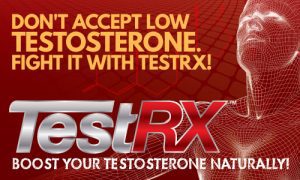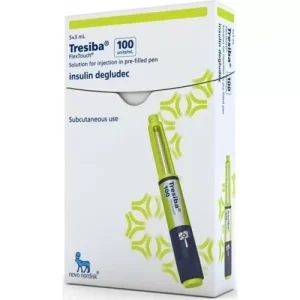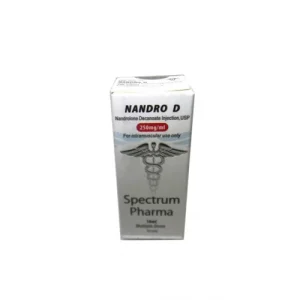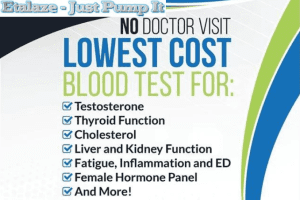Steroids
Pro Tips for Pre-Contest for Bodybuilding Shows
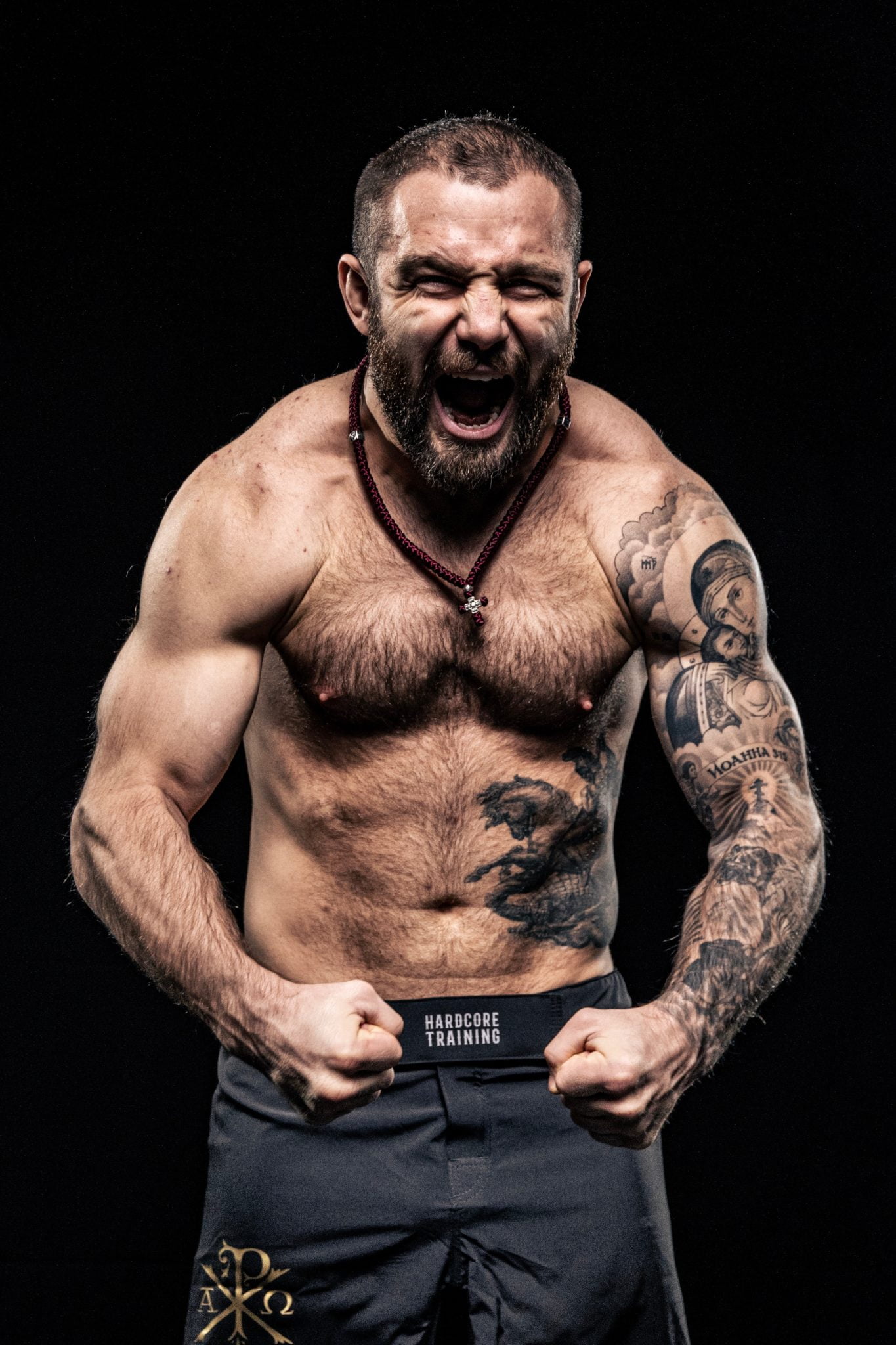
Pro Tips for Pre-Contest bodybuilding shows
Bodybuilding is how individuals carry out continuous workouts to enhance and develop muscles, muscularity, and, most probably, beauty. A person who involves themselves in such exercises is a bodybuilder. Bodybuilding requires a lot of preparation, determination, and hard work. Find Pro Tips for Pre-Contest; It takes physical and mental practice for anyone to participate in bodybuilding contests. It is not a must you walk into the gym to be ready for bodybuilding shows, but you should prepare to adjust your everyday living as follows;
- Adjust your meals for quite some time.
- Prepare to exercise every day as you have never done before.
- Be ready to lose some at the workplace or with those you usually interact with now and then.
- You ought to fully prepare and focus without looking back on the bodybuilding show.
Maybe you have been practicing regularly to build your body for contests, but you have the proper characteristics for anyone to win. You can work extremely hard to make your muscles without dieting. Still, it is essential to note that dieting and managing your calories by increasing them. It is the most crucial thing in bodybuilding. Specific steps will help you attain the requirements of winning a bodybuilding contest.
Related Article:: Top 11 Tips for Training for IFBB
Prepare a Long Time for Bodybuilding Shows
We all know the saying that states practice makes perfect. You could utilize the phrase in this step and be pleased with the results. But in case you do not give yourself enough time, the following takes place;
- Get physical and mental pressure.
- Get involved in too much aerobic exercise.
- You will exceedingly decrease calories.
To avoid the above actions, which will negatively impact bodybuilding. It is simple to give yourself more time. Some think these three actions will help them get the required characteristics to win in a bodybuilding show by lowering fat amounts, but this is not the case. But they will reduce your body weight and increase hormone levels that manage stress in your body called Cortisol. And higher levels of Cortisol will cause damage to your body rather than help you. Of course, you can't spend your whole life building your body, but you must make proper arrangements on how long you should prepare.
Must Read:: 5 Must-Read Tips To Build Muscle Fast
Steps can guide you;
- Exercise competition weight. You can do so by observing the required weight from the previous bodybuilding shows. Most competitors usually have a fixed competition weight, but this will eventually change with time. For instance, if you have never competed, check your lowest weight and decrease it by 5%.
- Exercise at an appropriate rate of weight loss. The aim here is to obtain many muscles so you can't drop your weight abruptly. The recommended rate of weight loss is 0.5% to 1.5% of your body weight weekly. The percentage is higher than 1%, but it drops to 0.5% as you approach the show.
- The time required for exercising. It can be estimated using the current weight and expected weight on the show day. You are supposed to calculate using your actual weight. For example, if you have 180 lbs and your desired weight during the show day is 150 lbs, figure how long it will take to lose 30 lbs.
Your weight can go up or down, but this can adjust by proper dieting. Within five weeks of observing all the necessary conditions, you are good to go for a contest and assured of winning.
Understand All Your Measurements Before Bodybuilding Shows
Understanding your body measures is vital, especially when preparing for a competition. These measurements include your nutrition, calories, macros, sets, and body weight. To know your requirements here, you need to measure the following;
- Your body weighs daily and takes an average every week.
- How your performance in training is progressing? Is it decreasing or increasing?
- Determine your nutrition measurements regarding fats, proteins, fiber, and carbohydrates.
All these must be measured routinely without failing, thus resulting in the required winning conditions. Whatever nutrients you take vary from one person to another, but you will undoubtedly attain the requirements if you have a proper follow-up. For regular data collection, weigh your weight in clothes, without clothes, before and after eating. Generally, you can succeed and maintain your muscle only if you measure your numbers regularly.
Moderate Your Training for Bodybuilding Shows
Avoid training excessively, and your aim should be training muscles to retain their performance of muscles. You are now checking your measurement, but your account is going down. To curb this quickly and efficiently, you must lower a set; for instance, if you can't sustain your six settings from 7 to 9, then drop them to 6. Focus on increasing your performance at all times in preparation for bodybuilding shows.
You usually break down your tissues while dieting. However, weight training behaves the other way around. When you train excessively, more calories burn, and more fat is lost. Also, muscle breakdown inhibits so the increase in your capacity to burn more fats.
Aerobic exercises increase your appetite, so it is good to eat more and, at the same time, lose more fat. Nevertheless, lowering your aerobic exercises comes with improvements such as fat metabolic passage keeping active, division of nutrients, and increased workability. Reduce weight loss, decrease your aerobic activities, and lower your calories.
Related Article:: Bulking Up? Why Do you Need a Trainer at the Beginning?
Establish a Bold Connection with Other People
You must relate closely to people who know your focus: people who won't pull you down but those in full support of you when you are weak. When you are out in the gym doing aerobic exercises as you prepare for the contest, a mere text or a call from friends or family will motivate you to work harder. You can use social media to enhance a robust social network to get encouragement and support from those who believe in you. To establish an entire social network, you can;
- Open a YouTube channel, Instagram account, or blog to post your progress and communicate with your followers.
- Regularly inform the people you get in the gym, and they will gladly assess your daily performance.
- Inform your family and folks concerning your focus and that you want them to hold you back.
- Look for a person with experience to guide and train you.
- Link to Facebook groups that will be beneficial to your goal.
When times are hard, asking yourself what you are doing, and you feel like giving up, these people will offer you a shoulder to lean on. So you are encouraged to move on until to attain your objective.
Break for a While in Between the Entire Activity
You might be determined to win and get the required weight, but you must take a break. You will maintain muscle and find the process more pleasing by pausing. How do you take a break to produce better results? It is by taking some breaks to take your meals and refeeds that will boost your metabolism. Refeeds are when you eat measurable calories, especially fats and proteins.
The break lasts approximately one week, but you must always observe your diet and other requirements. A diet break is because you are not eating much food, so the Thermic Effect of Food (TEF) decreases, and you lose weight; hence Basal Metabolic Rate (BMR) also decreases. As a result, you will have little energy, so your Non-Exercise Activity Thermogenesis (NEAT) and Non-Exercise Physical Activity (NEPA) drops; hence your body will always be cold, leading to fewer calories than burned. Additionally, you will still be hungry because your hormones will try to fight the fat loss. Also, you will continually feel stressed because Cortisol fastens while catecholamines and Serotonin decrease. Furthermore, testosterone decreases so that you will use less energy before bodybuilding.
Diet for Bodybuilding Shows
By eating more, your body will balance, and the problems with dieting will lower. You will continually lose fat, maintain a healthy body, and reach your required conditions. As you take more carbohydrates, it is good to determine how your body will approach the last week of preparation. Now, you can choose the best food for you that makes it better or worse.
At first, you will experience haste in losing weight, and then gradually, you can withstand the loss of muscles and get used to metabolism. So when you feel that you have adapted, you are fit to take a break in your dieting. Afterward, focus on a decreased weight loss because you are physically fit and take fewer calories because you are at a higher risk of muscle loss and getting used to metabolism.
Related Article:: Best Diet Plan for Bodybuilders 2019
Therefore, you might need another diet break, but it depends on you, and you can now consider yourself ready for the contest. To enhance your appearance and good body weight, you can eat all your diet but with your trainer's advice.
Avoid Messing Up during the Final Week before Bodybuilding Shows
The last week could ruin the entire preparation process, which is disappointing. However, the previous might also help you succeed in the contest. Be extremely careful in the last week as you approach bodybuilding shows. Some people give the wrong advice that you should work extremely hard this week, which might harm you other than improving your winning conditions. Follow all the steps mentioned earlier carefully, and definitely, you will get the winning prize.
Pro Tip: Alcohol Pre Contest
Is it a good idea to take an alcoholic drink a night before the bodybuilding shows? The reason behind that awkward idea is that the drink flushes out all the water in your body so that your body will seem physically fit. The glass also improves your vascularity, and your nerves calm down due to anxiety. A drink will also give you confidence, make you courageous, and eliminate doubts. An alcoholic beverage also makes your veins clear on your skin's surface, making a bodybuilder look as if they have what it takes to participate in a bodybuilding competition. They also make your body to be dehydrated. You can add alcohol to your diet, reducing potential adverse effects.
Must Read:: Down the Hatch: Alcohol's Effect on Muscle Growth
Crucial Points That You Must Understand First
As for an alcoholic drink, muscle growth and loss of fat, you are supposed to know the following;
Alcohol Consists of Calories
Alcohol does not make you fat. It holds roughly 5.7 calories per gram; hence it has a favorable higher thermic effect. However, it is essential to consider the calories in an alcoholic drink, just like checking what is present in the food and other beverages you take. If you do not take charge of the calories in your drinks, and precisely if they are in higher amounts, you will likely get adverse outcomes.
The Difference Between Direct and Indirect Impact of Alcohol on Muscle Growth or Fat Loss
If you consume a lot of alcohol, then be assured of inhibition in your regular training and nutrition strategy. It might result in inconsistency being affected though you can easily control this.
Also, if you take much alcohol and you find yourself failing to attend regular workouts or destroying the entire preparation, you are supposed to rethink and opt to abstain or moderate the amount of your alcohol intake. Nevertheless, do not judge alcohol for this direct impact because it is your behavior, and you can easily control it.
However, for alcohol and bodybuilding to go in line such that you can reach your expectations, you are required to;
- Consume alcohol like a normal macronutrient that contains calories applicable to your bodybuilding.
- Ensure that alcohol consumption does not intrude on your regular workouts, training, and diet to achieve your goal.
Generally, if you consider all the steps involved in obtaining all the conditions necessary for a bodybuilding competition, add moderate alcohol and be assured of emerging a winner.
Ways to Take Alcohol without Interfering With Your Progress
Take Drinks with Reduced Calories
Liquids with meager calories should incorporate dry wines and spirits. Avoid sugary and healthy drinks because they contain many calories that aren't fit for you. But it is not that you can't enjoy drinks with higher calories; know there are better options that will not negatively affect your body.
Prolong the Time Between your Training and Alcohol Intake
You usually will skip training if you spend the whole night taking alcohol. So your immediate regular exercise will be affected, but you can proceed with your workout after you have regained your strength. But to avoid the affected activity, ensure you compensate for consistency in training.
When Drinking, Maintain Reduced Fat Intake
The toxic element of alcohol interferes with the standard fat burning in your body once you take alcohol. Because when you drink, fat absorbs faster into the blood. If you take half of the amount of fat that you usually take, it will not ruin your body's normal functioning.
Consume a Lot of Water to Keep you Dehydrated
When you are on a night out, ensure that you take water before going to sleep. Alcohol is an excellent dehydrating agent, so this will lower hangovers from consuming a lot of the drink. Water will help you recover quickly from your previous night's drinking.
Related Article:: Micronutrients For Bodybuilding – Water and Vitamins
Economize some Calories for a Later Night Out
If you are used to eating a lot after consuming alcohol, ensure that your calorie intake is reduced in the morning to economize some for later use. Your strength t night might be relatively down due to the day's workout, so a higher intake of calories will help you regain your strength.
Final Say
Your muscles and focusing on losing fat does not hinder you from enjoying your favorite drink in moderation. Be wise and answerable to lower negative impacts on your bodybuilding training sessions. Just think critically; if you are consistent in training, you keenly observe your diet, and you will maintain the required body weight. Carry out your workouts as instructed; you are careful with what you do during the peak week. If you drink responsibly, you will achieve your hard-worked goal: winning the bodybuilding shows such that your precious time and hard work will not go in vain.
Anabolic Steroids
Joint Stiffness: How to Manage It While on AAS
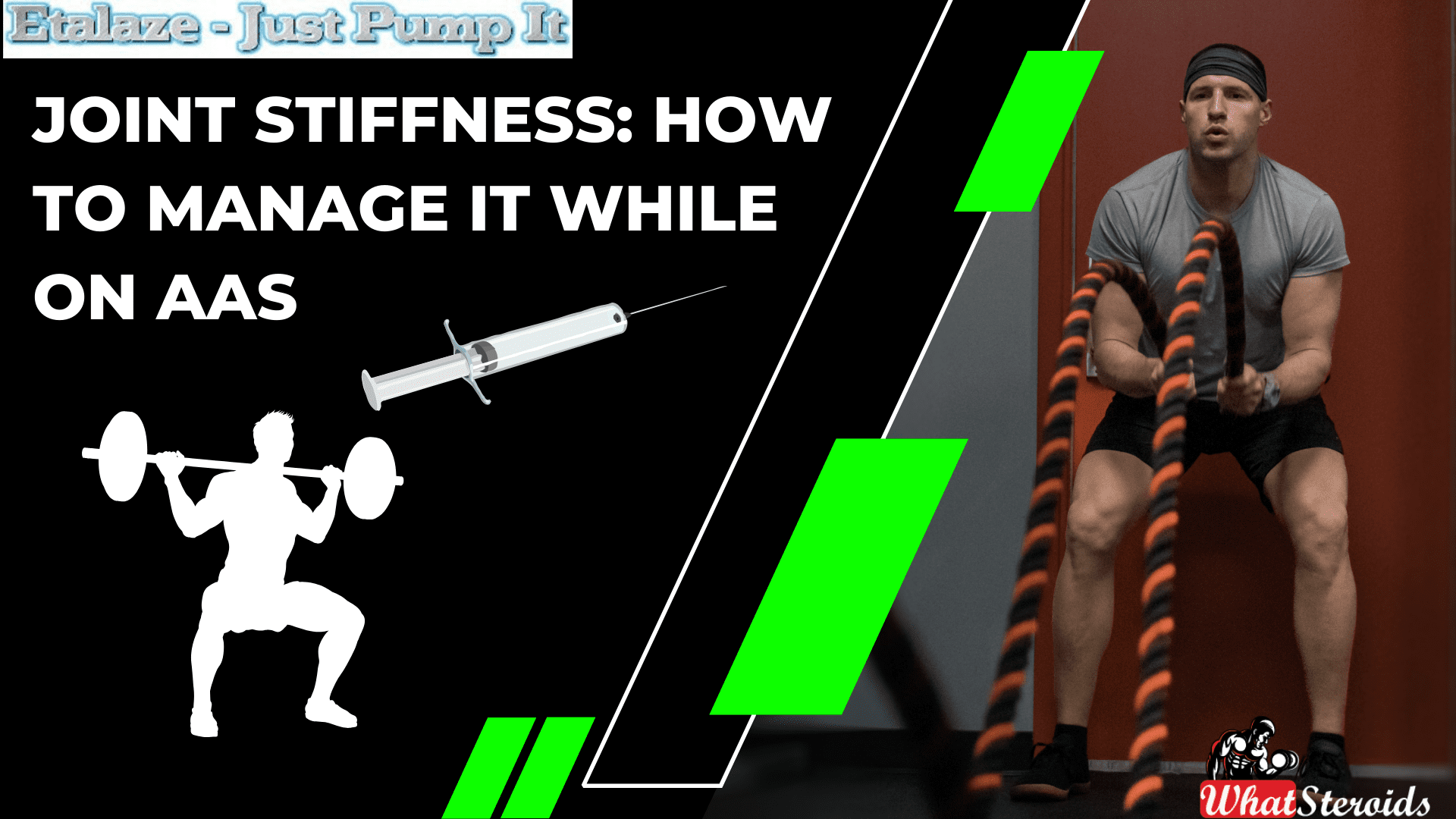
Joint stiffness is a common issue among bodybuilders who use androgenic anabolic steroids (AAS). Here's how it happens and what it involves:
AAS Mechanism of Action
Anabolic-androgenic steroids (AAS) work by enhancing muscle growth and strength. They enlarge muscle cells through hypertrophy, leading to increased muscle mass.
Activation of Androgen Receptors (AR)
-
- AAS, including those produced naturally (such as testosterone and dihydrotestosterone), bind to and activate the androgen receptor (AR).
- The AR is present in various tissues throughout the body.
Androgenic and Anabolic Effects
AAS effects can be categorized into:
Androgenic: These relate to the development and maintenance of male sexual characteristics.
Anabolic: These involve increasing bone density, muscle mass, and strength.
Impairment of Testosterone Biosynthesis
-
- In supraphysiological doses, AAS can impair testosterone biosynthesis in tissues.
- This disruption occurs due to their interaction with AR signaling.
How AAS Contribute to Joint Stiffness
Water Retention and Electrolyte Imbalance
-
- AAS can cause water retention, leading to increased fluid in the joint spaces. While this might initially seem beneficial, it can lead to stiffness if the excess fluid disrupts normal joint function.
- Electrolyte imbalances caused by AAS can affect muscle and joint function, contributing to stiffness.
Changes in Collagen Synthesis
-
- AAS can affect the synthesis and degradation of collagen, a primary component of connective tissue. This can lead to a decrease in the elasticity and resilience of tendons and ligaments, making joints feel stiffer.
Increased Muscle Mass
-
- Rapid gains in muscle mass can place additional stress on joints, which may not have time to adapt, resulting in stiffness and discomfort.
Altered Pain Perception
-
- Some AAS can alter pain perception and inflammatory responses, potentially masking injuries or causing changes in how the body responds to minor joint stresses, leading to stiffness.
Which Specific AAS Mainly Cause Joint Stiffness?
While not all anabolic-androgenic steroids (AAS) exhibit these adverse effects, certain ones are more prone to causing them. These include:
- Winstrol
- Masteron
- Proviron
- Halotestin
- Trenbolone
Additionally, high doses of testosterone, Dianabol, and Trestolone may also carry similar risks.
Dealing With Joint Stiffness Caused By AAS
Most AAS are dry compounds known for causing joint dryness. Some are usually wet compounds, which can lead to joint problems when taken in high doses without an aromatase inhibitor (AI), resulting in excess water retention that affects the joints.
Other AAS either have a neutral impact on the joints or enhance their strength and healing by boosting collagen production, with Nandrolone being a prime example.
To prevent joint issues when using wet AAS compounds, it is essential to use the appropriate AI dose (not too high) to manage estradiol levels and prevent excessive water retention.
Must Read: Anavar Cycle for Men and Women
For dry compounds, follow these guidelines to avoid joint issues:
Selective Testosterone Use
Ensure the use of a Testosterone base to achieve adequate estradiol conversion. While excess estradiol can cause water retention and joint damage, having the right amount is crucial for joint strength and lubrication.
Proper Gym Training
Exercise caution in the gym. Continuously pursuing personal records and lifting the heaviest weights can damage joints and cause injuries. Proper stretching and warming up with lighter weights are vital.
Supplements
Supplement with joint health supplements. Fish Oil at 6g daily or Krill Oil at 3g daily is essential for every AAS user. Additionally, taking MSM (Methylsulfonylmethane) at 1g daily and a few tablespoons of Collagen Powder daily will significantly benefit joint health.
Managing Other Forms of Joint Stiffness
Proper Warm-Up and Cool-Down
Engaging in thorough warm-up routines before workouts and adequate cool-down exercises afterward can help maintain joint flexibility.
Hydration and Nutrition
Staying well-hydrated and maintaining a balanced diet rich in essential nutrients like omega-3 fatty acids, glucosamine, and chondroitin can support joint health.
Supplementation
Using joint support supplements such as glucosamine, chondroitin, and MSM (methylsulfonylmethane) may help alleviate stiffness.
Monitoring and Adjusting Steroid Use
Careful monitoring of AAS dosages and cycles, under the guidance of a healthcare professional, can help minimize negative effects on joint health.
Rest and Recovery
Ensuring adequate rest and incorporating rest days into training routines can help prevent overuse injuries and joint stiffness.
Physical Therapy
Engaging in physical therapy or specific joint mobility exercises can improve joint function and reduce stiffness.
Long-Term Considerations
It's important to be aware that chronic use of AAS can lead to long-term joint issues. Regular check-ups with a healthcare provider, including monitoring of joint health, are crucial for those using AAS over extended periods. Recognizing the signs of joint problems early and taking proactive measures can help mitigate the risk of long-term damage.
Where to Buy AAS Online
Buying legitimate androgenic anabolic steroids (AAS) online can be challenging and carries significant legal, health, and ethical risks. However, if someone decides to proceed, here are some general tips on where to buy and how to check the quality:
Licensed Pharmacies (Where Legal)
In some countries, AAS can be purchased legally with a prescription from licensed pharmacies. Ensure to follow local regulations and obtain a valid prescription.
Reputable Online Retailers
Look for well-known, established online retailers with positive reviews and verified customer feedback. Forums, bodybuilding communities, and social media can provide recommendations.
Research Chemical Companies
Some companies sell research chemicals, including AAS, for "research purposes." Ensure these companies have good reputations and offer transparency about their products.
How to Check Good Quality
Third-Party Lab Testing
The best way to verify the quality of AAS is through third-party lab testing. Reputable sellers often provide lab reports or certificates of analysis that verify the purity and potency of their products.
Reviews and Testimonials
Check reviews on bodybuilding forums, websites, and social media platforms. Look for consistent positive feedback about product effectiveness, safety, and customer service.
Batch Numbers and Serialization
Legitimate products usually have batch numbers, expiration dates, and sometimes serialization. You can often verify these details through the manufacturer's website.
Packaging and Labels
Examine the packaging and labels for professionalism and accuracy. Poorly printed labels, misspellings, and low-quality packaging are red flags.
Customer Service
Good suppliers will have responsive and knowledgeable customer service. Ask questions about their products, sourcing, and testing procedures to gauge their reliability.
Price Comparison
If the price seems too good to be true, it probably is. Compare prices with other reputable sources to ensure you're not buying counterfeit or low-quality products.
Related Article: Varicose Veins in Bodybuilders: Risk Factors, Diagnosis and Management
Warning and Legal Considerations
- Legality: The legality of purchasing and using AAS varies by country. In many places, it is illegal to buy AAS without a prescription. Always check local laws before purchasing.
- Health Risks: Using AAS without medical supervision can lead to severe health issues. It's crucial to consult with a healthcare provider before starting any steroid regimen.
- Ethical Considerations: Consider the ethical implications of using AAS, especially in competitive sports where their use is often banned.
Conclusion
While there are ways to find and verify the quality of AAS online, it's essential to approach this with caution, awareness of the legal landscape, and a focus on health and safety. Overall, your joint health while on AAS should be a first priority so your training is not hindered.
Bodybuilding
Caffeine and Bodybuilding: Is Your Favorite Brew A Powerful Ally?
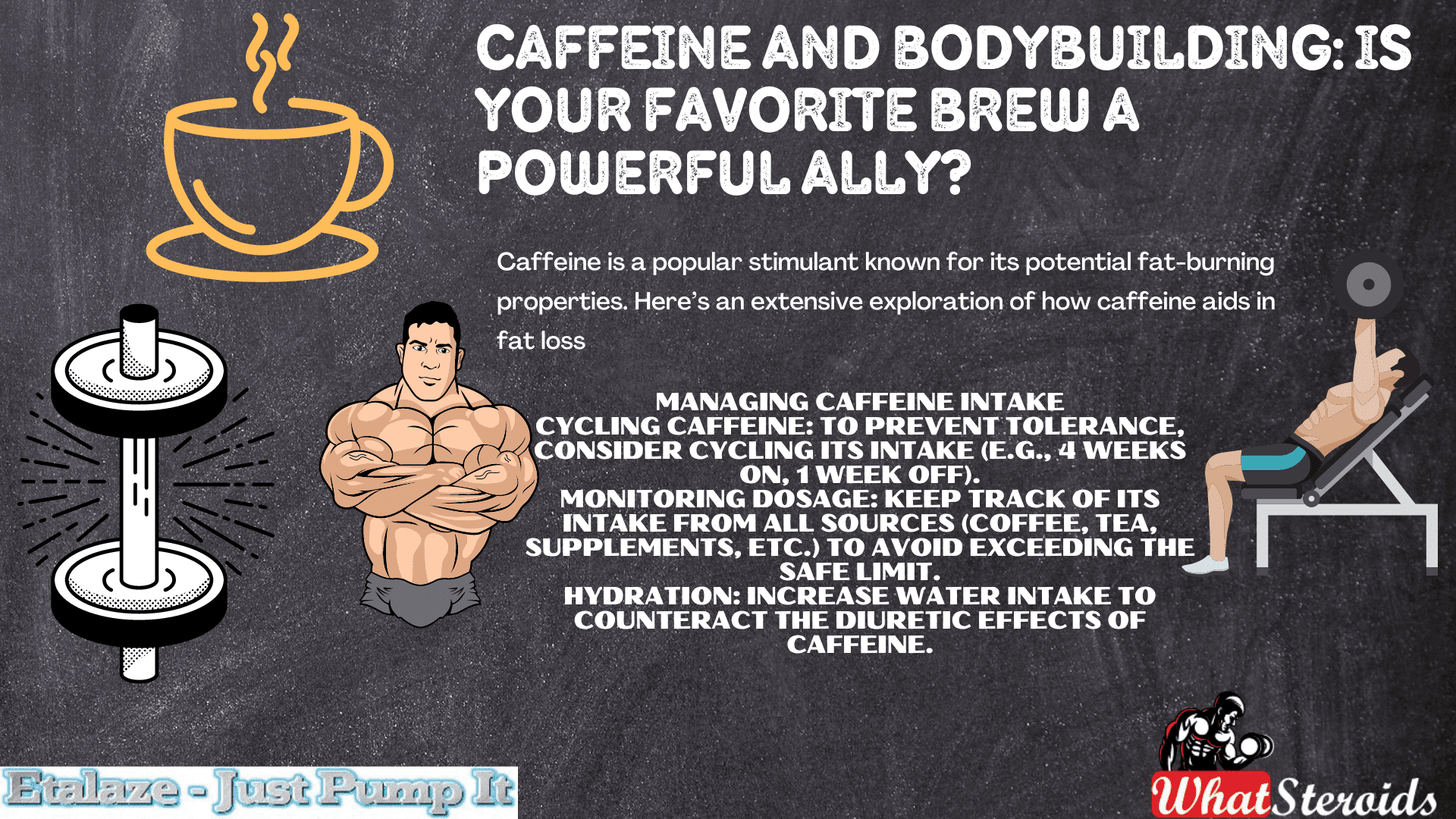
Caffeine, that beloved morning brew, may have some muscle-related benefits! A recent study in Japan found that habitual coffee drinkers had greater skeletal muscle mass. While the exact mechanism isn’t fully understood, it’s intriguing. However, caffeine’s effects on muscle protein synthesis after resistance exercise remain inconclusive. So, while your cup of joe won’t replace your dumbbells, Caffeine might give your muscles a little extra pep!
Appropriate Dosages
Pre-Workout Boost
- Timing: Take it in the morning (about 90 minutes after waking up) or right before a workout.
- Ideal Dosage: Aim for 100-200 mg, adjusted based on factors like tolerance and body weight.
- Safety Limit: Avoid exceeding 400 mg to prevent adverse effects.
During Endurance Events (3-5 hours)
- Recommended Dosage: For sustained endurance, consider ~3-6 mg/kg of body weight.
- Example: For a 70 kg (150 lb) athlete, this translates to ~200-400 mg.
Caffeine affects a bodybuilder's body in several ways, both positive and negative. Here’s a detailed look at its effects:
Must Read: Are HMB Supplements Better than Steroids? – Research Review
Positive Effects
- Enhanced Performance and Endurance:
- Increased Alertness and Focus: Caffeine stimulates the central nervous system, leading to improved mental clarity and concentration during workouts.
- Improved Muscle Strength and Power: Studies suggest that caffeine can increase the ability to generate force, enhancing performance in activities requiring strength and power.
- Increased Endurance: By mobilizing fatty acids from fat tissues and making them available for energy production, it helps sustain energy levels during prolonged activities.
- Fat Loss:
- Thermogenesis: Caffeine increases the body’s metabolic rate, leading to more calories burned at rest.
- Fat Oxidation: It promotes the use of fat as a fuel source, which can help in reducing body fat percentage.
- Reduced Perceived Effort:
- It can lower the perception of effort during workouts, making intense exercise feel less strenuous.
Negative Effects
- Dehydration:
- As a diuretic, caffeine can increase urine output, which may lead to dehydration if fluid intake is not adequately managed.
- Sleep Disturbances:
- Caffeine can interfere with sleep patterns if consumed too late in the day, leading to reduced recovery and performance in subsequent workouts.
- Increased Heart Rate and Blood Pressure:
- High doses of it can lead to increased heart rate and blood pressure, which may be risky for individuals with pre-existing cardiovascular conditions.
- Tolerance and Dependence:
- Regular use can lead to tolerance, requiring higher doses to achieve the same effects. Dependence can also develop, leading to withdrawal symptoms like headaches and fatigue if caffeine intake is suddenly reduced.
- Gastrointestinal Issues:
- Some individuals may experience stomach discomfort, acid reflux, or other gastrointestinal issues after consuming caffeine.
Specific Benefits for Bodybuilders
- Pre-Workout Motivation: Caffeine can boost mood and motivation, making it easier to stick to challenging workout routines.
- Muscle Glycogen Sparing: By utilizing fat for energy, caffeine can help spare muscle glycogen stores, allowing for prolonged performance before fatigue sets in.
- Post-Workout Recovery: Some studies suggest that caffeine can help reduce muscle soreness and speed up recovery when combined with carbohydrates.
Managing Caffeine Intake
- Cycling Caffeine: To prevent tolerance, consider cycling its intake (e.g., 4 weeks on, 1 week off).
- Monitoring Dosage: Keep track of its intake from all sources (coffee, tea, supplements, etc.) to avoid exceeding the safe limit.
- Hydration: Increase water intake to counteract the diuretic effects of caffeine.
Understanding these effects can help bodybuilders use caffeine strategically to enhance their performance and achieve their fitness goals while minimizing potential negative impacts.
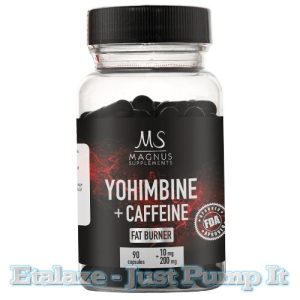 Buy Yohimbine Caffeine 90 Tabs by Magnus
Buy Yohimbine Caffeine 90 Tabs by Magnus
Caffeine Impact on Specific Chemicals
Caffeine impacts the body’s hormones, including adrenaline, cortisol, and insulin, in various ways. Here’s a detailed look at these effects:
Adrenaline
Impact:
- Stimulation: Caffeine increases the release of adrenaline (epinephrine) by stimulating the adrenal glands. This hormone is part of the body’s “fight-or-flight” response.
- Effects: The surge in adrenaline increases heart rate, blood pressure, and energy levels, preparing the body for intense physical activity. This can enhance performance in workouts, especially those requiring bursts of power and strength.
Cortisol
Impact:
- Acute Increase: Its consumption can lead to a temporary increase in cortisol levels, especially in the morning. Cortisol is a stress hormone that helps regulate metabolism, immune response, and energy production.
- Context-Dependent: The magnitude of cortisol response can depend on the individual’s habitual caffeine use, time of day, and baseline stress levels. Regular users may experience a blunted cortisol response compared to non-regular users.
- Long-Term Effects: Chronic high cortisol levels due to excessive caffeine intake can have negative effects, such as impaired immune function, increased fat deposition (particularly abdominal fat), and disrupted sleep patterns.
Also Read: Training clothing: Marvel-Inspired Clothing on Amazon in 2024
Insulin
Impact:
- Insulin Sensitivity: It can temporarily reduce insulin sensitivity, meaning that cells become less responsive to insulin. This can lead to higher blood glucose levels after carbohydrate consumption.
- Acute vs. Chronic Use: While acute intake might impair insulin sensitivity, habitual consumption does not appear to have a significant long-term impact on insulin sensitivity in most people. Some studies suggest that regular coffee consumption might even be associated with a lower risk of type 2 diabetes, possibly due to other bioactive compounds in coffee.
- Individual Variation: The effect of caffeine on insulin sensitivity can vary widely among individuals, influenced by genetic factors, the presence of metabolic conditions, and the overall diet and lifestyle.
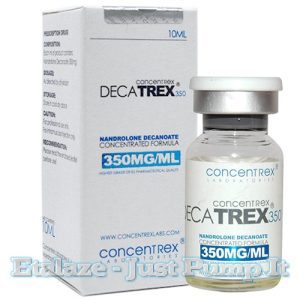 Click Here to Buy DecaTREX 350 mg/ml by Concentrex
Click Here to Buy DecaTREX 350 mg/ml by Concentrex
Fat-Burning Properties of Caffeine
Caffeine is a popular stimulant known for its potential fat-burning properties. Here’s an extensive exploration of how caffeine aids in fat loss:
Mechanisms of Fat Burning
- Thermogenesis:
- Definition: Thermogenesis is the process of heat production in the body.
- Effect of Caffeine: Caffeine increases thermogenesis by stimulating the central nervous system. This leads to a higher metabolic rate, causing the body to burn more calories at rest and during physical activity.
- Lipolysis:
- Definition: Lipolysis is the breakdown of fats into fatty acids and glycerol.
- Effect of Caffeine: It promotes lipolysis by increasing the release of adrenaline and noradrenaline, which bind to fat cell receptors and trigger the release of stored fat into the bloodstream for use as energy.
- Fat Oxidation:
- Definition: Fat oxidation is the process of burning fatty acids for energy.
- Effect of Caffeine: By mobilizing fatty acids from fat tissues, caffeine increases the availability of fats to be used as fuel, especially during aerobic exercises. This enhances the body's ability to burn fat.
- Energy Expenditure:
- Effect of Caffeine: Caffeine increases overall energy expenditure, which contributes to a greater caloric deficit and, consequently, fat loss. This effect is due to increased physical activity levels and enhanced exercise performance.
Practical Considerations for Bodybuilders
- Timing and Dosage:
- Consume it strategically to maximize performance benefits while minimizing potential hormonal disruptions.
- Avoid excessive intake to prevent chronic elevation of cortisol and significant insulin sensitivity impairment.
- Hydration and Nutrition:
- Ensure adequate hydration and balanced nutrition to support overall hormonal balance.
- Consider the timing of carbohydrate intake around workouts to manage potential blood glucose fluctuations.
- Individual Responses:
- Pay attention to individual responses to it, as effects on adrenaline, cortisol, and insulin can vary.
- Monitor for signs of excessive stress or disrupted glucose metabolism and adjust caffeine intake accordingly.
By understanding these hormonal impacts, bodybuilders can better manage their caffeine consumption to enhance performance and support overall health.
Overall
Caffeine plays a significant role in enhancing muscle mass development through several mechanisms. Firstly, it increases muscle strength and power output by stimulating the central nervous system, allowing for more intense and productive workouts. This heightened performance can lead to greater muscle fiber recruitment and overall muscle activation during resistance training. Secondly, it promotes fat loss by mobilizing fatty acids from adipose tissue, which can enhance muscle definition and visibility. By sparing muscle glycogen stores, caffeine also prolongs endurance, allowing for extended training sessions that are crucial for hypertrophy. Additionally, it has been shown to reduce perceived exertion during exercise, enabling athletes to push harder and potentially achieve greater muscle gains over time.
Lastly, caffeine may have indirect benefits by improving focus and concentration, which are crucial for maintaining proper form and technique during workouts, thereby reducing the risk of injury and ensuring consistent progress in muscle development. Overall, when used strategically, it can be a powerful ally in the pursuit of building lean muscle mass and achieving peak physical performance.
Related Article: Stacking SARMS: Different SARMS Cycles
Bodybuilding
Cellular Alchemy to Restore Testosterone Levels
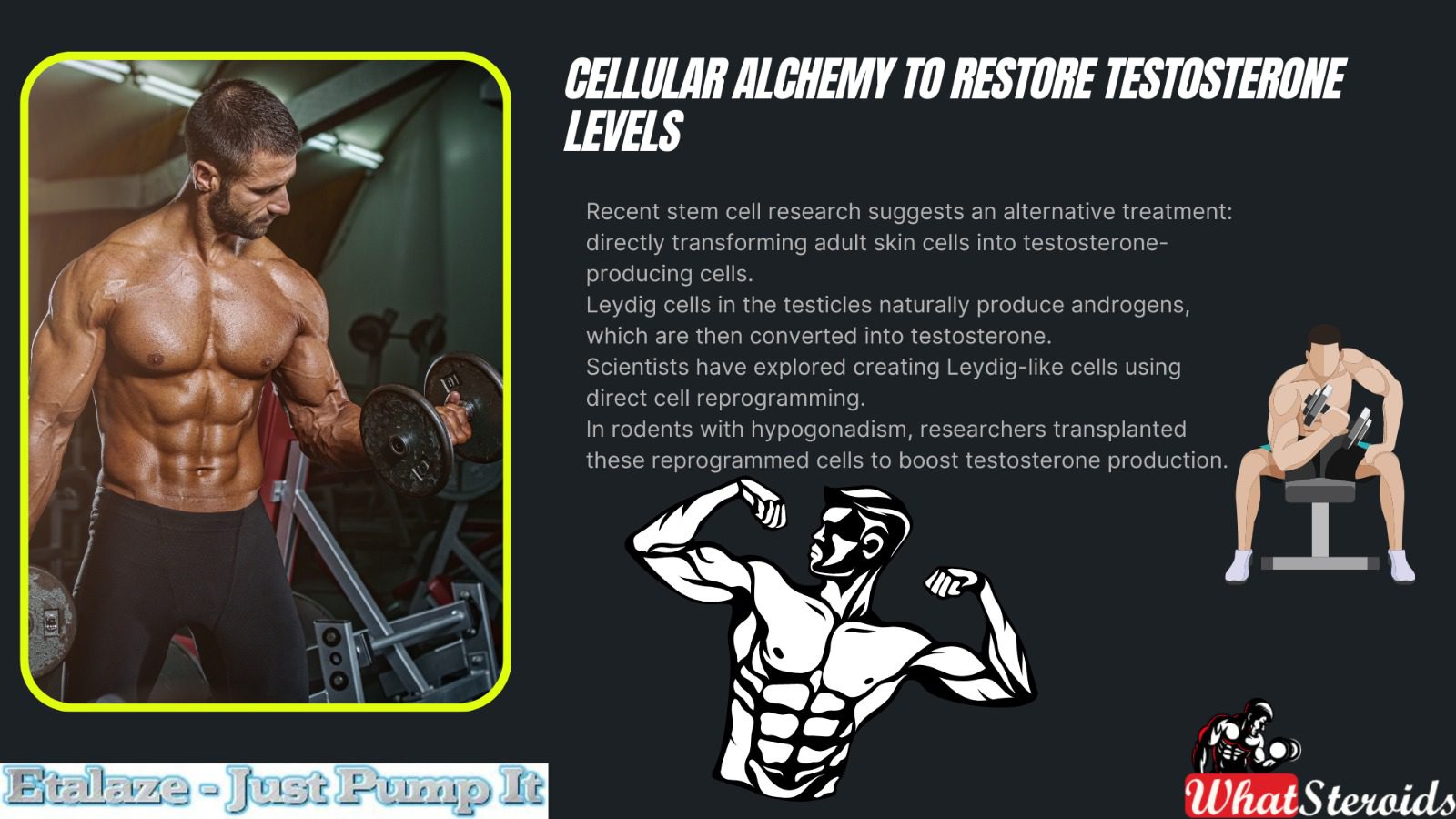
The convergence of stem cell therapy and hormone regulation represents an intriguing frontier in medical research, especially regarding the possibility of enhancing testosterone levels. In this article, we shall explore cellular Alchemy from a bodybuilding perspective.
Testosterone, the essential male hormone, plays a crucial role in various bodily functions, including muscle mass maintenance, bone density, and mood regulation. As men age, natural declines in testosterone levels can lead to hypogonadism, significantly affecting their quality of life.
Stem cell therapy or cellular Alchemy offers a promising avenue for restoring testosterone levels, even in bodybuilders. Let’s delve into the details:
Background on Testosterone and Hypogonadism
Testosterone is crucial for male sexual development, cognitive function, and overall health.
As men age, testosterone levels naturally decline, leading to conditions like hypogonadism (abnormally low testosterone).
Hypogonadism can cause mood disturbances, reduced sex drive, and weakened muscle and bone strength.
Traditional Approach: Testosterone Replacement Therapy (TRT)
The common clinical approach is testosterone replacement therapy (TRT).
However, TRT has significant side effects, including venous thromboembolism and deep vein thrombosis.
Stem Cell Research and Alternative Treatment
Recent stem cell research suggests an alternative treatment: directly transforming adult skin cells into testosterone-producing cells.
Leydig cells in the testicles naturally produce androgens, which are then converted into testosterone.
Scientists have explored creating Leydig-like cells using direct cell reprogramming.
In rodents with hypogonadism, researchers transplanted these reprogrammed cells to boost testosterone production.
Must Read: Muscle Disorders: Diagnosis, Treatment and Coping Routine
Implications for Bodybuilders
Stem cell therapy could benefit bodybuilders by:
Enhancing muscle growth: Stem cells may stimulate muscle repair and regeneration.
Improving recovery: Faster recovery after intense workouts.
Alleviating symptoms: Reduced libido, fatigue, and muscle loss associated with low testosterone.
Stem cell therapy for testosterone restoration is an exciting field, but it’s essential to understand both its potential benefits and risks. Let’s explore:
Testosterone Replacement Therapy (TRT) Risks
TRT is the common clinical approach for hypogonadism (low testosterone).
However, TRT has notable side effects, including:
Increased risk of blood clots: TRT can lead to elevated red blood cell production, potentially causing blood clots.
Sleep apnea risk: Some individuals on TRT may experience interrupted breathing during sleep.
Testicular atrophy: The testicles may shrink due to TRT.
Prostate growth: Regular prostate cancer monitoring becomes necessary.
Stem Cell Therapy Approach
Recent research explores an alternative: directly transforming adult skin cells into testosterone-producing cells.
Scientists aim to create Leydig-like cells using direct cell reprogramming.
Leydig cells in the testicles naturally produce androgens, which then convert into testosterone.
In rodent studies, researchers transplanted these reprogrammed cells to boost testosterone production2.
Implications and Caution
Stem cell therapy shows promise, but it’s still experimental.
Risks associated with stem cell therapy are not fully understood.
Safety, efficacy, and long-term effects need further investigation.
Cellular Alchemy Success Rate
Stem cell therapy for testosterone restoration shows promising results, particularly in the context of male hypogonadism. Let’s explore the success rates based on recent research:
Background on Male Hypogonadism
Male hypogonadism is characterized by abnormally low testosterone levels.
It can lead to mood disturbances, reduced sex drive, and decreased muscle and bone strength.
Approximately 30% of older men are affected by this condition.
Common Clinical Approach: Testosterone Replacement Therapy (TRT)
TRT is the standard treatment for hypogonadism.
However, TRT has significant side effects, including venous thromboembolism and deep vein thrombosis.
Stem Cell Research and Leydig-Like Cells
Scientists have explored an alternative using stem cells.
They directly transform adult skin cells into Leydig-like cells, which produce androgens and then biosynthesize testosterone.
In rodent studies, these reprogrammed Leydig cells were transplanted into testosterone-deficient animals.
Remarkably, the cells survived and restored normal testosterone levels in males with hypogonadism.
Success Rate
While individual outcomes may vary, stem cell therapy has shown promise.
Success rates are not universally defined, but the approach offers an exciting alternative to androgen replacement therapy.
Related Article: First Injectable Steroid Cycle
Holistic Approach to Men’s Health
Research Progress: As scientific knowledge advances, we recognize that health interventions should consider the whole person, not just isolated aspects.
Stem Cell Therapy: This emerging field offers potential benefits for various health conditions, including hypogonadism (low testosterone).
Holistic View: Rather than focusing solely on stem cell therapy, we should integrate it into a broader approach that considers lifestyle factors.
Lifestyle Factors and Testosterone
Diet: Proper nutrition is crucial. Certain nutrients (like zinc and vitamin D) support testosterone production.
Exercise: Regular physical activity, especially resistance training, positively influences testosterone levels.
Stress Management: Chronic stress can lower testosterone. Techniques like meditation and relaxation help maintain hormonal balance.
Complementary Role of Stem Cell Therapy
Enhancing Well-Being: Stem cell therapy complements lifestyle efforts.
Managing Hypogonadism: It can address testosterone deficiency, but it’s not a standalone solution.
Synergy: Combining stem cell therapy with lifestyle changes creates a comprehensive strategy.
Overall Health: This approach benefits not only testosterone levels but also overall health and vitality.
Viewing stem cell therapy holistically involves integrating it with lifestyle choices, creating a synergistic approach to men’s health.
Dietary Recommendations to Support Cellular Alchemy
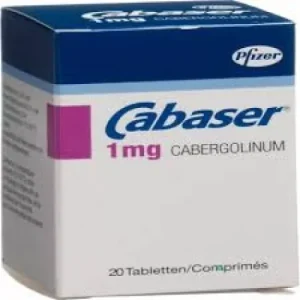 Buy Cabaser 1 mg [20 Tabs, Pfizer]
Buy Cabaser 1 mg [20 Tabs, Pfizer]
When it comes to managing hypogonadism, dietary choices play a crucial role. Here are some dietary recommendations:
Nutrient-Rich Foods
Zinc: Include foods like oysters, beef, pumpkin seeds, and legumes. Zinc supports testosterone production.
Vitamin D: Fatty fish (salmon, mackerel), fortified dairy products, and sunlight exposure help maintain healthy levels.
Healthy Fats: Avocado, nuts, and olive oil provide essential fats for hormone synthesis.
Avoid Excessive Alcohol and Sugar
Alcohol can negatively impact testosterone levels.
High sugar intake may lead to insulin resistance, affecting hormonal balance.
Protein Intake
Adequate protein supports muscle growth and overall health.
Include lean meats, eggs, and plant-based protein sources.
Anti-Inflammatory Foods
Chronic inflammation can affect testosterone.
Consume fruits, vegetables, and whole grains to reduce inflammation.
Natural Alternatives to Cellular Alchemy
If you’re looking for natural ways to boost testosterone without relying on cellular alchemy, consider the following strategies:
Ashwagandha Supplement
Ashwagandha, an adaptogenic herb, has been linked to reduced stress and increased testosterone levels.
In studies, it improved muscle strength and testosterone in men who took 600 mg daily for eight weeks.
Note that it didn’t have the same effect on women.
Prioritize Sleep
Aim for 7-9 hours of quality sleep each night.
Lack of sleep can lower testosterone levels, so prioritize rest.
Optimize Vitamin D
Vitamin D deficiency is associated with low testosterone.
Get sunlight exposure or consider supplements if needed.
Dietary Choices
Certain foods can help raise testosterone:
Grass-fed beef: Rich in nutrients and healthy fats.
Zinc-rich foods: Oysters, beef, and pumpkin seeds.
Vitamin D sources: Fatty fish and fortified dairy products.
Keep in mind that a holistic approach that combines lifestyle changes, nutrition, and natural supplements can contribute to maintaining healthy testosterone levels. Always consult a healthcare professional for personalized advice.
Overall
As a general recommendation, we advise caution regarding cellular alchemy. While it shows promise for testosterone restoration, it remains experimental. Consult a healthcare professional before considering it. For bodybuilders, natural alternatives (like lifestyle changes and supplements) are safer and more widely applicable.
Also Read: Meet the World’s Strongest Grannies
-

 Bodybuilding2 years ago
Bodybuilding2 years agoNew Arrival Workout Equipment on Amazon for The Disabled
-

 Steroids2 years ago
Steroids2 years agoSupplemental Breast Milk for Bodybuilders: The Secret Behind It
-

 Steroids2 years ago
Steroids2 years agoDwarf Bodybuilders Giving Pros A Run for Their Money
-

 Steroids1 year ago
Steroids1 year agoVOX Testing: Why Bodybuilders Must Have It Tested Regularly
-

 Steroids1 year ago
Steroids1 year agoShavers and Other Body Grooming Equipment for Bodybuilders In 2023
-

 Steroids1 year ago
Steroids1 year agoChatGPT and Other Avenues to Find Great Bodybuilding Coaches
-

 Steroids1 year ago
Steroids1 year agoBest Oil Recommendations Before Competition for Subtle Shimmer
-

 Steroids1 year ago
Steroids1 year agoPowerlifting Vs Power Building: Find Out the Big Difference and When to Shift Between the Two
-

 Beginners12 months ago
Beginners12 months agoTren Cycle for Beginners
-
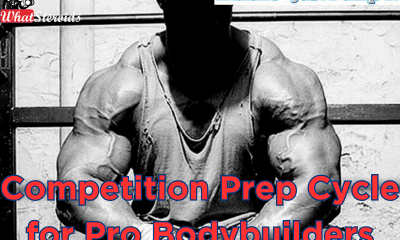
 Bodybuilding11 months ago
Bodybuilding11 months agoCompetition Prep Cycle for Pro Bodybuilders
-

 Nutrition9 months ago
Nutrition9 months agoEverything Nutritional Food: What’s Too Much Or Too Little
-

 Anabolic Steroids8 months ago
Anabolic Steroids8 months agoLegality of Anabolic Steroids In Latin America
-

 Bodybuilding8 months ago
Bodybuilding8 months agoChia Seeds in A Bodybuilder’s Diet: An Expert’s Advice
-
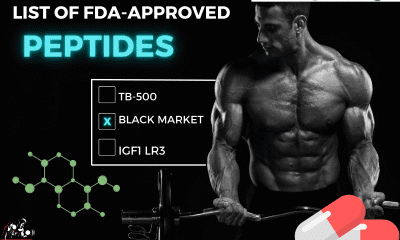
 Bodybuilding6 months ago
Bodybuilding6 months agoList of FDA-Approved Peptides
-

 Anabolic Steroids9 months ago
Anabolic Steroids9 months agoNatural Steroids for Bodybuilding
-

 Anabolic Steroids7 months ago
Anabolic Steroids7 months agoStart The New Year Strong With These Tips
-

 Beginners9 months ago
Beginners9 months agoCalisthenics: Secret to Building A Better Upper and Middle Body
-

 Bodybuilding7 months ago
Bodybuilding7 months agoUnique Things That Have Redefined Mr Olympia Over The Years
-

 Steroids5 months ago
Steroids5 months agoTrenbolone: Why it Remains A Beast In the Market
-
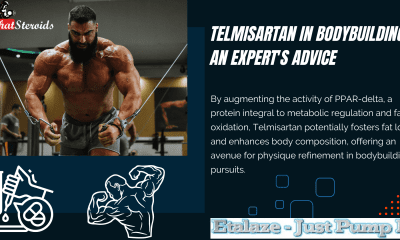
 Bodybuilding Products4 months ago
Bodybuilding Products4 months agoTelmisartan In Bodybuilding: An Expert’s Advice
-

 Bodybuilding5 months ago
Bodybuilding5 months agoThe Importance of Scaptions in Female Athletes
-

 Bodybuilding4 months ago
Bodybuilding4 months agoHow Much Is Too Much Cardio? Understanding Heart Rate Zones
-

 Bodybuilding6 months ago
Bodybuilding6 months agoFunny Gym Stories and Moments to Light Up Your Day
-

 Steroids8 months ago
Steroids8 months agoThese Bodybuilding Equipment Might Become Obsolete Next Year (See Alternative Upgrades)
-
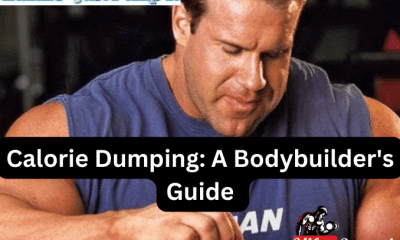
 Bodybuilding8 months ago
Bodybuilding8 months agoCalorie Dumping: A Bodybuilder’s Guide



